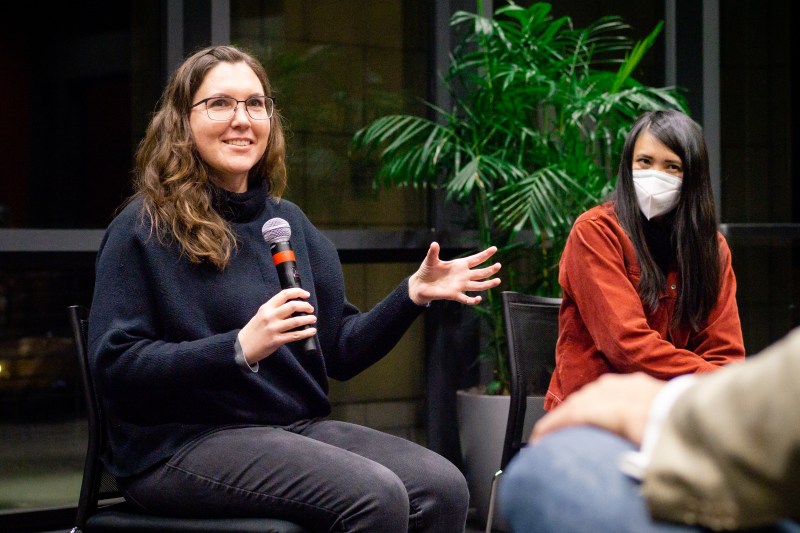“Through blood, sweat, tears and inspiration, [writers] create a new magic on the page,” said Nick Jenkins, interim director of Stanford’s Creative Writing Program. Indeed, the two writers he was introducing brought a certain magic into the room last night.
On Wednesday, Faith Merino and Jade Cho, first-year Stegner Fellows at Stanford, presented excerpts from their work in the program’s second reading of the year at the Huang Engineering Center. Merino is the author of the novel “Cormorant Lake” and other prose appearing in publications such as The Indiana Review, Harpur Palate and The Carolina Quarterly. She is currently working on her second novel and a short story collection. Cho is a poet and slam artist, as well as the granddaughter of Hoisanese immigrants. Her background inspired her current project looking at historical memory and her own family archives.
Merino opened with a short story titled “For the Hillside Boys,” featuring a group of adolescent girls with an all-consuming obsession to see the titular boy band on tour. As the story progresses, this desire turns them to the occult. The mood grows darker — while retaining undertones of humor — as the consequences of their amateur conjuring unfold. Ominous, vivid imagery accompanies these events, such as the recurring motif of “fat green flies” buzzing overhead and glimpses of “oil-slick fur” — perhaps the devil lurking nearby.
One of the characters recalls interactions with her friend’s father. Intrigued by the idea of “a man who knew and understood and accepted their monstrousness” as young teenage girls, she develops a crush on him. At one point, Merino stopped to admit that this detail is “one-hundred percent autobiographical,” drawing laughs from the audience.
Cho’s reading had notes of voices from beyond as well, albeit in a very different way than Merino’s. Her poetry focused on her identity as the granddaughter of Hoisanese immigrants, placing her in dialogue with her ancestors.
She began with elegies for her late father, reflecting on his role in her life and their relationship. In one particularly poignant poem, she describes processing the loss of her father through the “one hundred twenty hours of Star Wars” she watched in his last days. Cho recalls replaying the line, “It’s time to go, don’t be afraid,” as she watched her father slip away. The poem grieves the things left unspoken between them but ultimately ends on a hopeful image, the “blink of a falling star” that promises, “I’ll see you again.”
Reaching farther back in time, Cho then presented a series of poems confronting the legacy of the Chinese Exclusion Act and its impact on her personally. As a descendant of immigrants discriminated against because of this law, Cho spoke extensively on the topics of belonging and acknowledgment of her heritage. Her works read as not only a culmination of her research but a confrontation of the history of racist immigration policies in this country.
Cho explained that for her, poetry means “taking control of the language of your life,” in the words of poet June Jordan. This idea is evident throughout her writing as she explores the reclamation of language, be it her embracing her Hoisanese roots in “My Chinese Name” or incorporating language from her grandfather’s immigration files into “The Island.” These poems traverse between past and present, remembering the prejudices her grandfather faced a hundred years ago at Angel Island while continuing to react against the injustices of current-day immigration policies in the U.S. Cho ended her reading on a powerful note, a resolution to resist through her “refusal to forget.”
Following their readings, Merino and Cho participated in a Q&A session. When asked about the inspiration behind her writing, Merino explained that she wanted to “write a story for her soul” at a time when she was feeling sorry for herself. Concluding that “boy bands, demon conjuring and hot dads” were just what she needed, “For the Hillside Boys” was born.
Additionally, she acknowledged the influence of her upbringing in a highly superstitious family — with a mother who often claimed to see demons — as well as her childhood fantasies about the band Hanson, which inspired “creepy” fanfiction later evolving into her current works. As to what drew her into writing, Merino described her ADHD with self-deprecating humor and how it turned writing into a compulsion at times.
Cho spoke about her motivation for writing as well. “Everyone has their own story that no one else can write,” she told the audience, clearly passionate about the power of poetry. Speaking to the themes she focuses on, she explained that writing is a means of releasing her “diasporic angst.” Regarding her family’s response, she recalls having many insightful conversations with different relatives interested in diving deeper into their family history.
Both writers use language as a powerful medium for them to freely express otherwise repressed stories and feelings. I personally learned much last night, about topics from the uniqueness of every writer’s process to the far-reaching consequences of the Chinese Exclusion Act in American history. Ultimately, I believe that Merino and Cho urge us, the audience, to take our stories into our own hands as well, to dare to let ourselves indulge in or speak out about topics that matter to our souls.
Editor’s Note: This article is a review and includes subjective thoughts, opinions and critiques.
Editor’s Note: A previous version of this article misattributed a quote from June Jordan to Jade Cho. The Daily regrets this error.
